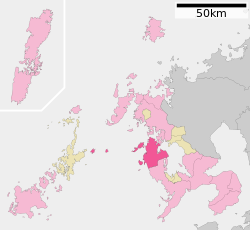Saikai, Nagasaki
Saikai
西海市 | |
|---|---|
 Saikai City Hall | |
 Location of Saikai in Nagasaki Prefecture | |
 | |
| Coordinates: 32°55′59″N 129°38′35″E / 32.93306°N 129.64306°E | |
| Country | Japan |
| Region | Kyushu |
| Prefecture | Nagasaki |
| Area | |
• Total | 241.84 km2 (93.37 sq mi) |
| Population (June 30, 2024) | |
• Total | 25,184 |
| • Density | 100/km2 (270/sq mi) |
| Time zone | UTC+09:00 (JST) |
| City hall address | 2222 Seto-kashiura-go, Oseto-cho, Saikai-shi, Nagasaki-ken 857-2302 |
| Climate | Cfa |
| Website | Official website |
| Symbols | |
| Bird | Japanese bush warbler |
| Fish | Sebastiscus marmoratus |
| Flower | Hibiscus hamabo |
| Tree | Hibiscus hamabo |

Saikai (西海市, Saikai-shi) is a city located in Nagasaki Prefecture, Japan. As of 30 June 2024[update], the city had an estimated population of 25,184 in 12447 households, and a population density of 100 people per km2.[1] The total area of the city is 241.84 km2 (93.37 sq mi).
Geography
[edit]Saikai is located on the northern tip of the Nishisonogi Peninsula, surrounded on three sides by the Goto Sea, Sasebo Bay, and Ōmura Bay, and islands scattered around the area. Most of the area has a ria coastline, with a complex, indented coastline. The highest peak on the peninsula is Mount Nagaura, 561 meters above sea level (the summit is in Nagasaki City). The area down to the coast is hilly and includes evergreen broad-leaved forests, cedar and cypress forests, orchards, and farmland, with a narrow plain.
Neighbouring municipalities
[edit]Climate
[edit]Saikai has a humid subtropical climate (Köppen:Cfa) with hot summers and cool winters. The average annual temperature in Saikai is 16.6 °C (61.9 °F). The average annual rainfall is 1,710.7 mm (67.35 in) with June as the wettest month. The temperatures are highest on average in August, at around 26.7 °C (80.1 °F), and lowest in January, at around 7.4 °C (45.3 °F).[2] Its record high is 36.7 °C (98.1 °F), reached on 21 August 2018, and its record low is −3.4 °C (25.9 °F), reached on 26 February 1981.[3]
| Climate data for Oseto, Saikai (1991−2020 normals, extremes 1977−present) | |||||||||||||
|---|---|---|---|---|---|---|---|---|---|---|---|---|---|
| Month | Jan | Feb | Mar | Apr | May | Jun | Jul | Aug | Sep | Oct | Nov | Dec | Year |
| Record high °C (°F) | 20.7 (69.3) |
21.9 (71.4) |
23.7 (74.7) |
27.0 (80.6) |
29.3 (84.7) |
34.2 (93.6) |
36.5 (97.7) |
36.7 (98.1) |
36.2 (97.2) |
30.8 (87.4) |
25.7 (78.3) |
22.5 (72.5) |
36.7 (98.1) |
| Mean daily maximum °C (°F) | 10.4 (50.7) |
11.6 (52.9) |
14.8 (58.6) |
19.0 (66.2) |
22.3 (72.1) |
24.9 (76.8) |
28.5 (83.3) |
30.2 (86.4) |
27.5 (81.5) |
23.0 (73.4) |
17.8 (64.0) |
12.8 (55.0) |
20.2 (68.4) |
| Daily mean °C (°F) | 7.4 (45.3) |
8.0 (46.4) |
10.8 (51.4) |
14.8 (58.6) |
18.4 (65.1) |
21.6 (70.9) |
25.4 (77.7) |
26.7 (80.1) |
23.6 (74.5) |
19.1 (66.4) |
14.3 (57.7) |
9.5 (49.1) |
16.6 (61.9) |
| Mean daily minimum °C (°F) | 4.6 (40.3) |
4.8 (40.6) |
7.2 (45.0) |
11.1 (52.0) |
15.0 (59.0) |
19.0 (66.2) |
23.3 (73.9) |
24.1 (75.4) |
20.8 (69.4) |
16.0 (60.8) |
11.2 (52.2) |
6.5 (43.7) |
13.6 (56.5) |
| Record low °C (°F) | −2.7 (27.1) |
−3.4 (25.9) |
−2.9 (26.8) |
3.2 (37.8) |
8.1 (46.6) |
12.1 (53.8) |
15.6 (60.1) |
18.6 (65.5) |
12.8 (55.0) |
6.6 (43.9) |
2.9 (37.2) |
−1.1 (30.0) |
−3.4 (25.9) |
| Average precipitation mm (inches) | 63.3 (2.49) |
72.9 (2.87) |
114.3 (4.50) |
142.7 (5.62) |
152.6 (6.01) |
268.3 (10.56) |
262.0 (10.31) |
197.4 (7.77) |
178.5 (7.03) |
98.1 (3.86) |
100.8 (3.97) |
78.6 (3.09) |
1,710.7 (67.35) |
| Average precipitation days (≥ 1.0 mm) | 9.1 | 8.6 | 10.5 | 9.4 | 9.2 | 13.1 | 10.7 | 9.6 | 9.4 | 5.8 | 8.4 | 8.5 | 112.3 |
| Mean monthly sunshine hours | 104.2 | 131.1 | 176.6 | 199.1 | 207.9 | 140.1 | 178.3 | 231.0 | 198.5 | 202.2 | 150.6 | 116.1 | 2,039.2 |
| Source: Japan Meteorological Agency[3][2] | |||||||||||||
Demographics
[edit]Per Japanese census data, the population of Saikai in 2020 is 26,275 people.[4] Saikai has been conducting censuses since 1920. The city's population peaked in the 1950s with more than 80,000 people. However, since 1960, Saikai's population has fallen sharply, and in the 1970s it was half what it was 10 years before; by 2020, the population will be only a third of what it was in the 1950s.
|
| |||||||||||||||||||||||||||||||||||||||||||||||||||||||||||||||||||||
| Saikai population statistics[4] | ||||||||||||||||||||||||||||||||||||||||||||||||||||||||||||||||||||||
History
[edit]Sakai is within ancient Hizen Province.
The city of Saikai was established on April 1, 2005, from the merger of five towns on the northern tip of Nishisonogi Peninsula: the former town of Saikai, Ōseto, Ōshima, Sakito and Seihi (all from Nishisonogi District). Its city hall is the former town hall of Ōseto.
Government
[edit]Saikai has a mayor-council form of government with a directly elected mayor and a unicameral city council of 18 members. Saikai contributes one member to the Nagasaki Prefectural Assembly. In terms of national politics, the city is part of the Nagasaki 4th district of the lower house of the Diet of Japan.
Economy
[edit]The economy of the towns in this area were dominated by fishing and whaling in the Edo period, and coal mining in the Meiji period. The area is now primarily agricultural, with forestry products and tourism also of importance. However, on Oshima island, north of Saikai and close to Sasebo, a large shipyard is active building bulk ships and metal structures, i.e. Oshima Shipbuilding, in which the Sumitomo Heavy Industries has shares.
Education
[edit]Saikai has 11 public elementary schools and six public junior high schools by the city government, and three public high schools operated by the Nagasaki Prefectural Board of Education. The prefecture also operates one special education school for the handicapped.
Transportation
[edit]Railways
[edit]The city does not have any passenger railway service. The nearest train station is Sasebo Station, with which it is connected by bus.
Highways
[edit]Sister cities
[edit] Bowen, Queensland. Australia[5]
Bowen, Queensland. Australia[5]
References
[edit]- ^ "Saikai City official statistics" (in Japanese). Japan.
- ^ a b 気象庁 / 平年値(年・月ごとの値). JMA. Retrieved March 30, 2022.
- ^ a b 観測史上1~10位の値(年間を通じての値). JMA. Retrieved March 30, 2022.
- ^ a b Saikai population statistics
- ^ "Bowen and Collinsville" (PDF). Tourism Bowen. p. 14. Archived (PDF) from the original on 15 March 2016. Retrieved 18 August 2016.
External links
[edit] Media related to Saikai, Nagasaki at Wikimedia Commons
Media related to Saikai, Nagasaki at Wikimedia Commons- Saikai City official website (in Japanese)



